
The Project Gutenberg EBook of Fleur and Blanchefleur, by Mrs. Leighton This eBook is for the use of anyone anywhere at no cost and with almost no restrictions whatsoever. You may copy it, give it away or re-use it under the terms of the Project Gutenberg License included with this eBook or online at www.gutenberg.net Title: Fleur and Blanchefleur Author: Mrs. Leighton Release Date: January 7, 2005 [EBook #14628] Language: English Character set encoding: ISO-8859-1 *** START OF THIS PROJECT GUTENBERG EBOOK FLEUR AND BLANCHEFLEUR *** Produced by Juliet Sutherland, Melissa Er-Raqabi and the PG Online Distributed Proofreading Team

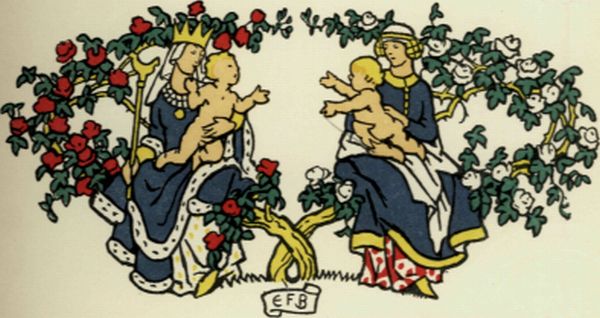
Chapter I
Chapter II
Chapter III
Chapter IV
Chapter V
Chapter VI
Chapter VII
Chapter VIII
Chapter IX
It is recorded by ancient chronicles that in the year of grace 624 a certain heathen King of Spain, Fenis by name, whose Queen was also a heathen, crossed over the sea with a mighty host into Christendom, and there, in the space of three days, made such havoc of the land, with destruction of towns, churches, and cloisters, that for full thirty miles from the shore where he had landed, not a human being or habitation was left to show where happy homes had been. Moreover, this King Fenis, while lading his ships with the booty thus ill-got, posted forty of his men in ambush over against the highway, there to lie in wait for any pilgrims who might pass by; and when presently a weary pilgrim band was seen toiling down the steep slope of a mountain nigh at hand, the forty thieves rushed out upon the pilgrims and threatened them with death, to escape which they readily parted with their goods; one only of the band showed fight, and he was a Count of France, conducting his daughter, a new-made widow, to the shrine of St. James at Compostella, where she had vowed to offer up prayer for her lord, lately slain in battle.
Bravely this Count fought, but all in vain, for, overborne by numbers, he was killed, and his daughter carried a captive to the heathen King Fenis, who, straightway taking ship, sailed back to Spain, and, when King Fenis was come home again, he divided the spoil among his soldiery, giving a portion to each man according to his rank; but the Christian lady he bestowed upon his Queen, who, long desirous of such an attendant, received her gladly into the royal apartments, suffering her to retain her Christian creed: in return for this kindness, the captive lady did good service, waiting faithfully both late and early on the Queen, and giving her instruction in the French tongue. Moreover, by her gentleness, wisdom, and discretion, this Christian captive won all hearts in the heathen court.
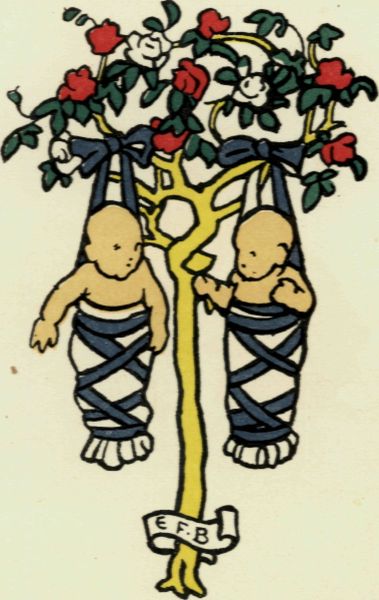
Now it happened that on Palm Sunday after these things the Queen gave birth to a lovely boy, whom the learned heathen masters, because he was born in the season of flowers, named Fleur; [more correctly 'Floire.'] and on that same Palm Sunday the Christian captive lady bore a daughter, whom with her own hands she baptized, giving her the name of Blanchefleur.
At the birth of his son, King Fenis rejoiced, and made great festivities; also he commanded that the infant should be nursed by a heathen, but brought up by the Christian captive, who, thus being charged with both children, tended them with such loving care that she scarce knew which was dearest to her, the King's son or her own daughter. So tended, the two children grew to be the sweetest and loveliest ever seen, and such was the love that they bore each one to the other that they could not endure to be parted.
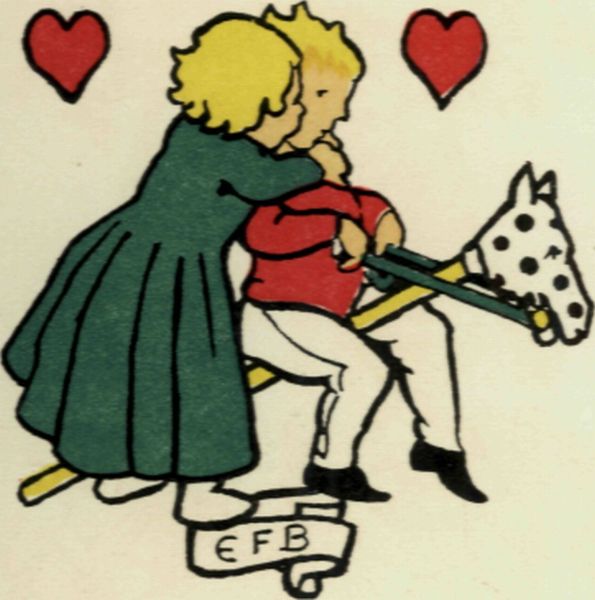


When some time had passed and King Fenis marked that the intelligence of his son was now beginning to awake, he called the child to him and said: 'Fleur, now must you go diligently to school and learn of the wise Master Gaidon.' But for all answer to this command Fleur burst into tears, crying out:
'Father! neither reading, writing, nor aught else will I learn, except I have Blanchefleur to be my fellow scholar.' To this the king consented, so the two children with great joy went hand in hand to school, and there by mutual aid and encouragement so quickly acquired the rudiments of learning that in no long time they were able to exchange love letters, which, being written in the Latin tongue, were not understood by the other scholars.
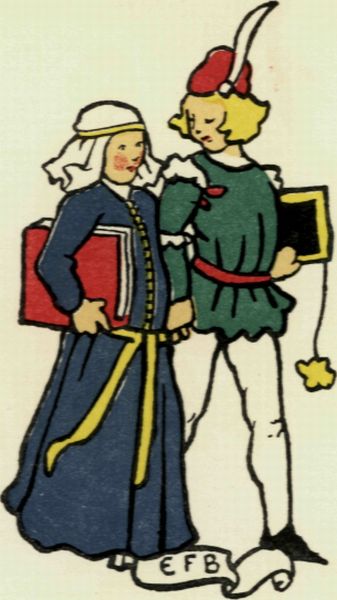
The tender love which, thus growing with their growth, knit the hearts of these two children together, began, however, to cause displeasure to the King, who, fearing lest it should tend to thwart his plan of wedding his son to a royal bride, determined to part the two, if by fair means—well! if not, then by Blanchefleur's death; but the Queen, in dread that her son might die of grief, pled with her lord to spare Blanchefleur, saying: 'Sir! rather command Master Gaidon, under pretext of failing health, to give up his charge. Thus shall occasion be made for sending Fleur to school at Montorio, where my aunt is Duchess, and among the many high-born maidens there assembled, haply he may find another love.'
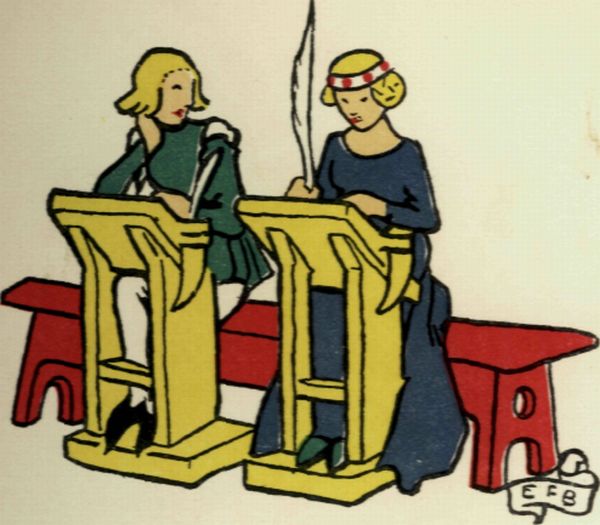
To this plan the King consented, yet found not in it the help he hoped; for, on hearing that he was to go to Montorio, leaving his Blanchefleur at home to tend her mother, who, like Master Gaidon, was commanded to feign herself sick, Fleur became so frantic with grief that, to calm his transports, the King and Queen were fain to promise that, in two weeks' time, Blanchefleur should follow him to Montorio.
Somewhat comforted by this promise, Fleur took a tender farewell of his love, whom he fondly kissed and embraced in the presence of her mother and his own father.
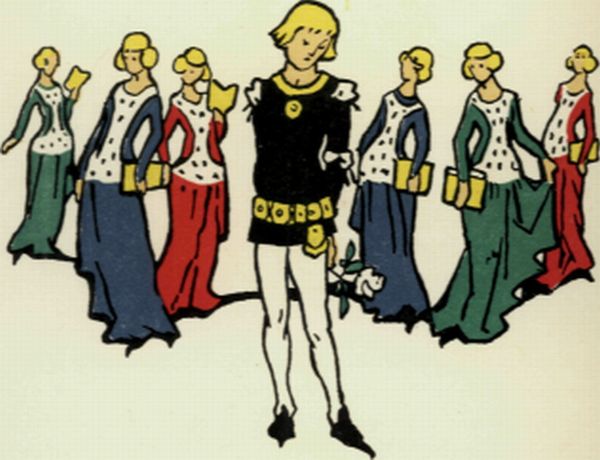
King Fenis, though by no means best pleased with his son's deportment, yet sent him nobly equipped and provided to Montorio, where, on arrival, Fleur was warmly welcomed by Duke Toras, the Duchess, and their daughter Sibylla, and, when recovered from the fatigue of travel, was by Sibylla conducted to school, where many a fair and noble damsel was to be seen. All was in vain: no matter what of beauty or of loveliness might meet his eye or strike his ear, the thoughts of Fleur were ever and only with his Blanchefleur, for whose sake he heaved many a sigh and dropped many a tear against the day appointed for her coming; and when it came and brought her not, because his parents trusted that she was now forgotten, Fleur drooped and pined; unable, from heaviness of heart, to eat, drink, or sleep; and when his chamberlain saw that Fleur was sick he hasted back to tell King Fenis, who, calling for his Queen, took counsel with her on the matter. 'What remedy there be for Fleur I know not,' said the King, 'but this thing I know full well, that Blanchefleur has cast a spell upon him, and by enchantment has bound him so fast in love to her that he can look on none other than herself; so go, fetch me Blanchefleur, that she may die and be forgotten.'
Once more did the Queen plead for Blanchefleur's life.
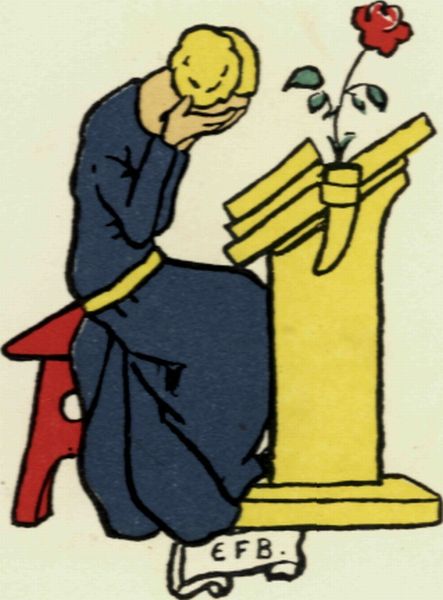
'Sir,' said she, 'it is ill said that Blanchefleur has bewitched our child, for she loves him with a love that passes words, and has known no joy since he departed, but sits alone in tears and sorrow, refusing to eat.'
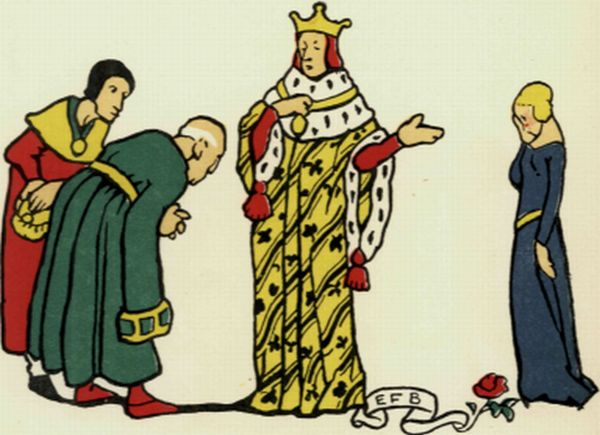
Thus did the Queen save Blanchefleur from a cruel death, and thus did she further counsel her lord: 'Ah, sir!' said she, ''twere sin and shame to slay the child thus untried and unheard; better far, let her be taken to the harbour, and there sold away into distant lands and never be heard of more.'
Approving the counsel of his Queen, King Fenis sent for two rich merchants, and bade them take Blanchefleur and sell her to foreign traders at the harbour of Nicæa, which they promised faithfully to do.
When dismissed from the presence of the King and Queen, these two merchants hastened to the port of Nicæa, and, out of the many foreign traders who there bought and sold, chose two rich dealers from a distant land, who purchased Blanchefleur at a price that caused the vendors to rejoice, for these men gave 100 pounds of gold, 100 of silver, 100 webs of Indian silk, 100 scarlet mantles, 100 good horses, and 300 birds, such as falcons, hawks, and sparrow-hawks: last and greatest of all, they gave a cup matchless in beauty and beyond all price. Vulcan had made this cup, and on it he had pictured how Paris, son of Priam, king in Troy, had carried off Helena, and was pursued in wrath by Menelaus, Helena's lord, together with his brother Agamemnon, at the head of a mighty host; and how the Greeks besieged and stormed Troy town, which the Trojans for their part defended, and when the city was taken, Æneas brought away the cup and gave it to a brother of his love Lavinia.
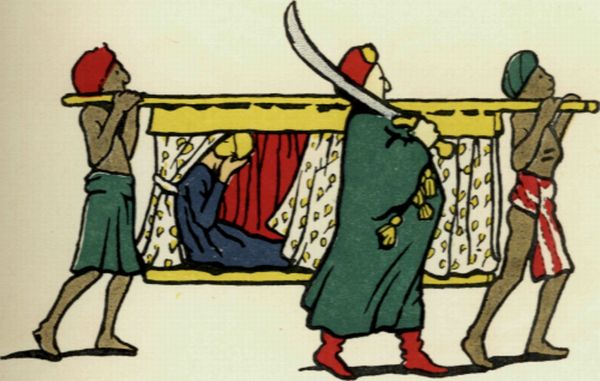
When the purchase was completed, these traders led Blanchefleur away to Babylon, and offered her for sale to its Admiral, whom she pleased so well that he bought her for ten times her weight in gold from these merchants, who, well pleased with the price bestowed, departed after thanks given to the Admiral, who, judging from her great beauty and rich attire that his new purchase must come of noble race, resolved to break his rule of oft-repeated marriage by plighting his troth once and for all to her and her alone. With this intent accordingly he sent Blanchefleur to the women's tower, appointing twenty-five maidens for her service and solace, seeing that she was ere long to be crowned Queen of Babylon.
No sooner, however, did Blanchefleur, a helpless stranger in a distant land, find herself in a chamber alone and undisturbed, than, giving way to tears and lamentations, she cried, 'Alas, Fleur! who has torn us asunder? Never shall I cease to love and mourn you, for well know I that your heart is rent with the same pangs of love and grief, and that we both must surely die, for without love who would consent to live?'
Now, leaving Blanchefleur thus bewailing herself at Babylon, let us return to King Fenis and his Queen. On receiving at the hands of the two merchants the goodly treasure paid as Blanchefleur's price, King Fenis was well pleased, but not so the Queen, who in trouble of spirit cried, 'Now must we take good heed what we do, lest Fleur our son die of grief.' King Fenis accordingly, after taking thought upon the matter, caused a tomb of exceeding beauty to be made, of ivory, of marble, and of crystals, and in the tomb was set a coffin, and on the coffin were figured in gold the images of two children in the likeness of Fleur and Blanchefleur; on the head of each child was a crown of gold, and in that of Fleur was set a carbuncle that sparkled bright by night as in the day. Moreover, long pipes were laid down, which, catching the wind as it blew, caused the children to fondle and embrace each other as though in sport and play, and when the wind ceased they stood still, each one proffering to the other the flowers it held, and all seemed natural as life itself.
Never had maiden a costlier tomb, for it was encrusted with precious gems, such as sapphires, chalcedonies, amethyst, topaz, turquoise, jasper, chrysolite, diamond, and jacinth; also in letters of gold it bore this inscription:
'Here lies Blanchefleur, who loved young Fleur
with tender love and true.'
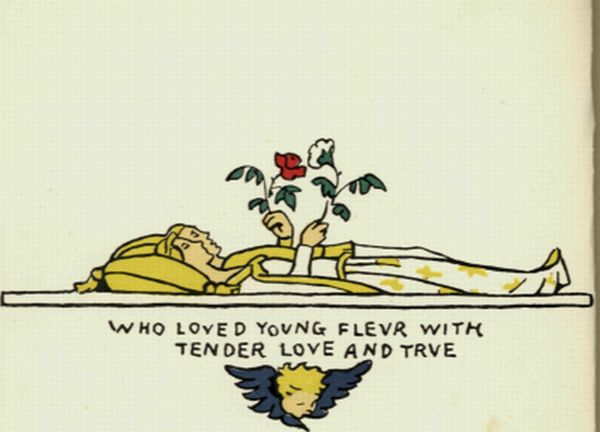
When all things were now ready, King Fenis, bidding his people beware for their lives of breathing a word to the effect that Blanchefleur, being yet alive, was not buried in this tomb, sent to Montorio, bidding his son return home. Joyfully did Fleur, all unknowing what had passed, obey the summons, and when, after greeting and salutation offered to his parents, he asked for Blanchefleur, and no man dared to answer him, he ran to her mother's chamber and asked where was Blanchefleur, whom he had left there.
'Fleur,' said the mother, 'I know not where she is.'
'Mock me not,' cried he, 'but say where is she whom for these three long weeks I have not seen?'
Then said the lady, 'Blanchefleur is dead and buried.'
At these words spoken Fleur fell stunned and senseless as though from a heavy blow, and the mother in her terror gave a cry, which, being heard throughout the court, brought the King and Queen running in, to behold with horror and dismay their child stretched lifeless on the ground.
When at length Fleur came to himself, neither prayers nor threats availed to calm the violence of his grief, but when he begged to see his beloved's tomb, the Queen his mother led him by the hand to the vault where she was supposed to lie; and, when Fleur read the golden letters that told how Blanchefleur lay within the tomb, he thrice fell fainting on it, and when at length his spirit came again, he cried, kneeling upon the tomb, 'Alas, my Blanchefleur! why have you forsaken me? We who lived and loved, should we not have died together? Woe, woe is me thus left without my love; Oh, cruel Death, to take my dear away! Why tarry now? come, take my life, or I myself will take it, and so pass to those bright fields of light where dwells the soul of Blanchefleur amid the flowers!'
After this lament Fleur arose, and drawing a golden stilus from its case, he said, 'This stilus, her parting gift, and all now left to me of Blanchefleur, shall be my comfort by taking me from a world in which without her I cannot bear to live.' So saying, Fleur would have stabbed himself to the heart with the golden stilus, but the Queen his mother tore it from his hand, crying: 'What madness were it to lose your life for love! Be well assured that never thus could you come to Blanchefleur in her flowery meads; rather would you be sent to dwell in eternal grief and pain with Pyramus and Thisbe, who for a like offence were condemned to seek forever the comfort that they shall never find in love: take heart, therefore, my child, for I have skill to call your Blanchefleur back to life.'
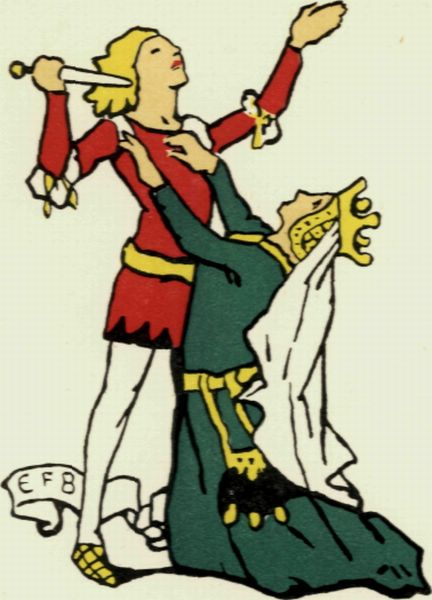
After these words spoken to Fleur, the Queen, in sore trouble of spirit, sought her lord the King, and showing to him the golden stilus, said, 'Sir, take pity on your child, for with this golden stilus he had done himself to death but for my staying hand; and, sir, were he, our only child, to die, bethink you how grievous would be our loss! Say then, sir, what think you were best to do?' To the entreaties of his Queen, King Fenis thus made reply: 'Tell Fleur to be comforted, seeing that his Blanchefleur lives.'
Glad at heart to be bearer of such a message, the Queen hasted to her son, and, taking him apart, she said to the sorrowing Fleur, 'Weep no more, but know the truth; your love lies not in the tomb.'
Then, opening the coffin and showing to him its emptiness, the Queen told all to Fleur: how she and the King his father had sent him to Montorio, that there he might forget his Blanchefleur, a Christian and a slave, and choose in her stead a heathen bride of royal race, and how, finding him still faithful, King Fenis could have slain Blanchefleur, but, yielding to his Queen's entreaties, had spared her life and sold her for much gold into distant lands.
Then, standing before that empty grave, Fleur rejoiced with exceeding joy, and vowed a vow that he would go forth and search through the wide world till he found his love or died in the attempt.

When Fleur had thus learned all the truth, he left the empty tomb and sought his father, saying, 'Father, let me go forth into the wide world to seek my Blanchefleur, for till she is found I can know neither peace nor joy.' Hearing these words from his son, King Fenis was sorely troubled, cursing in his heart the day on which he had sold Blanchefleur, whom now he would fain have bought back ten pounds dearer than he sold her, did he but know where she was to be found.
'Abide with me, O Fleur, my son!' pleaded the King, 'and I will wed you to a royal bride!'
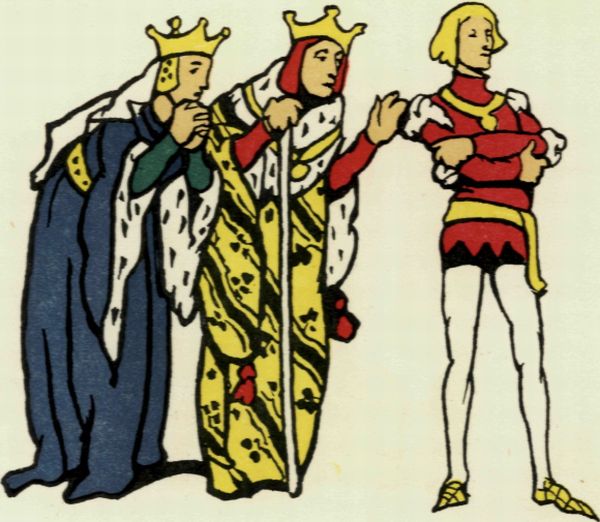
'Not so, my father!' Fleur replied; 'for there lives no woman upon earth that I can love save Blanchefleur, and her alone; so be content to let me go!'
'If needs must, then go,' said King Fenis, yielding to his son's desire, 'and I will make provision of all things needful for your journey.'
''Twere best,' said Fleur, 'for me to travel as a merchant; so give me, I pray you, twelve mules, three laden with skins, three with coin of the realm, two with costly apparel of silk, velvet and scarlet, and the other four with furs. Give me also twelve muleteers to lead the mules, and twelve men-at-arms to be my guard; likewise one of your stewards, and a chamberlain of wisdom and discretion; last of all, send with me the two merchants, who, having sold Blanchefleur into distant lands, will best know how and where to seek her.'
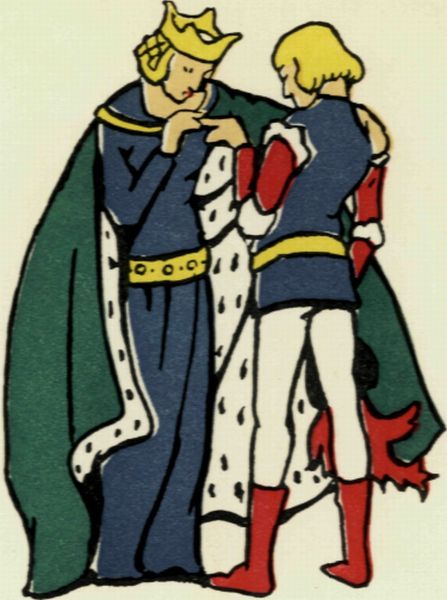
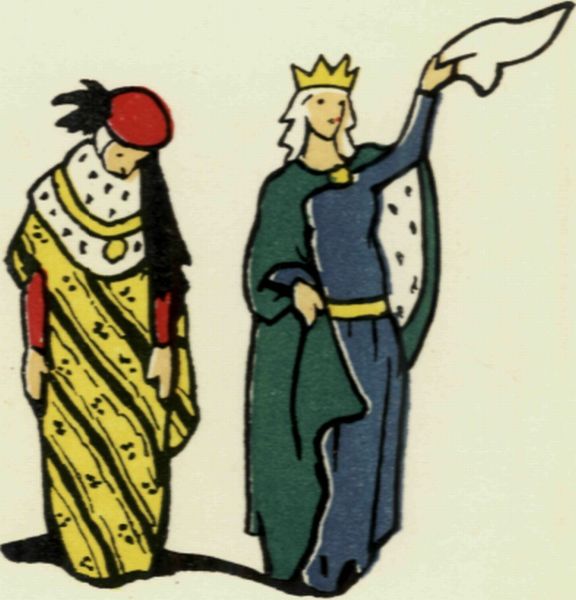
At the thought and talk of parting the King wept sore, yet gave to his son according to his desire, adding thereto a palfrey, richly caparisoned; and when Fleur, wearing golden spurs, was mounted on the palfrey and would be gone, his mother came to say farewell, and gave him as her parting gift a ring, which she bade him ever wear, for the fair gem set in this golden ring had magic power to ward off hurt from foe, or fire, or water, or of wild beasts, nor while he wore it could any man refuse him aught he asked: so Fleur, with heartfelt thanks to his mother for so great a gift, put the ring upon his ringer. Then came good-bye, said with sorrow sore and deep on either side, more especially by father and mother, who with sinking hearts thrice kissed their son, well knowing that they should see his face no more.
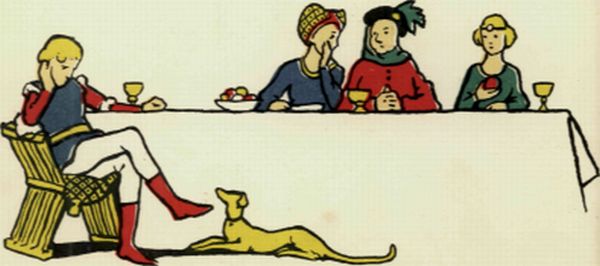
Thus provided and equipped with loving care did Fleur ride forth into the wide world in quest of Blanchefleur, steadfastly purposing to find her or perish in the quest; and, having left his home, he rode with all his train to the seaport of Nicæa, where Blanchefleur had been sold, and when come there he took his lodgings in the house of a rich man, who nobly entertained his guest; but Fleur, thinking only of his love, sate dolefully at table, scarce knowing what or if he ate, and this his mournful mien being perceived by the hostess, she bade her husband mark it too, saying, 'Master, see you how sad and thoughtful is that young man who sits and sighs? He calls himself a merchant, but I misdoubt me what may be the wares he seeks!' Then turning to Fleur himself this hostess said, 'Young sir, in sitting thus sad and silent, and keeping fast where a feast is spread; likewise, in age, mien, and bearing, you recall to my remembrance a fair maiden who no long time ago was here, and sate sighing as you now do. Her name was Blanchefleur, and Fleur the name of him she mourned, and for whose sake she was brought to this port of Nicæa and sold for a great price to merchants who were leading her away to Babylon, there, as they hoped, to sell her again at double the price they gave.'
At the sound of Blanchefleur's name Fleur answered not, but for very bewilderment of joy overturned the wine-cup before him with his knife. When somewhat come to himself, he drew from his stores a golden cup and offered it to the hostess, saying, 'Accept this cup as payment, both for the wine which has been spilt and for the tidings you have given of my lost Blanchefleur;' and when the hostess had thanked him, Fleur arose and went to the harbour, and there hired a ship in which to sail to Babylon; and when the ship was ready he and his servants, and all that they had, embarked in it, and sailed on and on till they came to a city called Bagdad; and at Bagdad they landed, and took up their abode with a rich man, who set the best of everything before them; but though Fleur sate at the table, his thoughts were far away with his lost love.
'Sir,' said the host, marking the dejection of his guest, 'why do you not eat? Is the fare not to your taste?' And when Fleur answered not to his inquiries, the host continued, 'Young sir, give ear to me! I will tell you somewhat to distract your thoughts. No long time ago some merchants came to this house to spend the night, and with them they brought a maiden, who for fairness of face and sorrow of heart resembled you, for she sate weeping, and would neither eat nor drink, and by those of her company she was called Blanchefleur.'
'Sir host!' cried Fleur with altered mien, 'can you not tell me more? Marked you not what road the travellers took on leaving you?'
'Young sir,' replied the host, 'they took the road to Babylon.'
Then Fleur arose, and brought from his store a golden cup and a scarlet mantle. 'Take these,' said he to the host, 'as my gift, but keep your thanks for Blanchefleur, who reigns within my heart.'
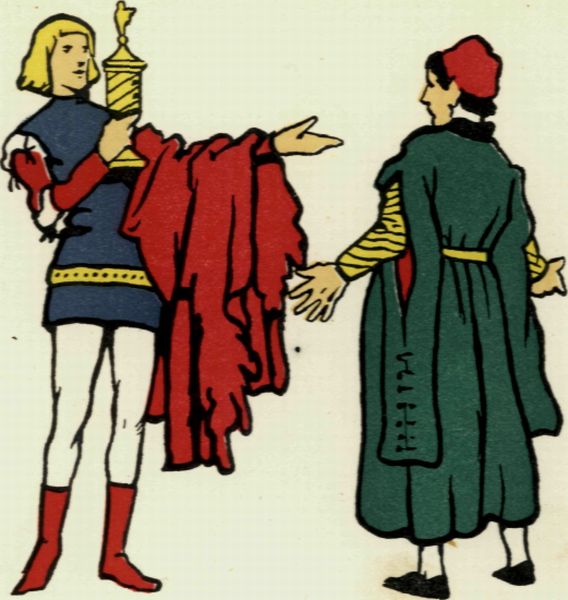
Well pleased with such a lordly gift, the host wished his guest God-speed and good-luck to find his love.
Supper over, the company retired to rest, and at the morrow's early dawn Fleur himself awoke his chamberlain and bade him rouse their people, as he would be up and away; so when all was ready they set forth, guided through the city by their host, and when he had set them on the right way, they rode on and on till they came to a great river, and saw on its farther side a city, Montfelis by name; and here was no bridge, but only a horn hanging on a cypress tree for those to blow who would call the ferryman.
So Fleur blew the horn, which being heard in Montfelis, presently a large boat appeared in which the servants and baggage were ferried across the river, but the master ferryman took Fleur alone in a little boat.

'Young sir,' said the boatman, marking the doleful bearing of his passenger, 'whither go you and what seek you in this land?'
'As you may see, we are merchants,' replied Fleur, 'and on our way to Babylon, but as to-night it is too late to travel farther, can you tell us of any hostelry where we and our horses may stay the night?'
'Sir,' said the boatman, 'truly I know of an inn to suit your purpose, but the cause which moved me to ask your journey's purpose is, that not long ago we ferried across this river a maiden who resembled you in form and sadness, and by the people with her she was called Blanchefleur; this Blanchefleur was the fairest creature ever seen; and in my own house she told me that she was loved by a heathen prince, and because of him had been sold away into distant lands.'
Starting up in eager haste at sound of Blanchefleur's name, Fleur cried, 'And whither went the maiden Blanchefleur on leaving you?'
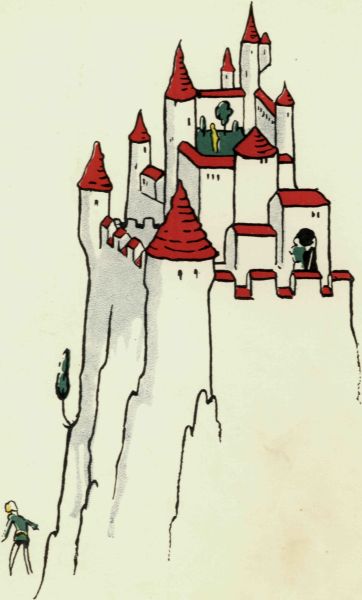
'Young sir,' replied the boatman, as I have heard tell, Blanchefleur was sold to the Admiral of Babylon, and he loved her more than all his wives.'
At these tidings Fleur rejoiced; but, fearing for his life, he let drop no word of seeking Blanchefleur.
After lodging for the night in the ferry-house, Fleur asked his host if he could commend him to any good friend in Babylon for lodging and furtherance in his trade.
'Yes, truly that I can,' replied the boatman. 'At the entrance to Babylon you will find a river, and on the river a bridge, and on the bridge a toll-keeper, to whom, if you give this ring from me, you will be welcome.'
Having said adieu to the friendly boatman, Fleur pushed on with such diligence that by eventide he reached the bridge which guarded the approach to Babylon, and, on presenting the ring to the toll-keeper, was by him kindly received and taken for the night to his house in the city.
Next day, when Fleur went forth to view the city, and beheld how great was the Admiral's might and how strong were the town's defences, his heart fainted within him. 'Alas!' thought he, 'I am now where Blanchefleur is, but what does that avail me? It was ill done to leave my father's house, where I might have found another love, and even now 'twere best to turn and save my life, for did the Admiral but hear of me I were a dead man, seeing that not for all the treasure of all the world would he give up my Blanchefleur; so what seek I here, where I have none to trust and no hope of help?'
While Fleur yet stood thus rapt in melancholy meditation, his host came up and thus accosted him: 'Friend! why stand you thus looking so ill-pleased? if any thing be amiss in your food and lodging, tell me and it shall be mended.'
'Sir,' replied Fleur, 'all in your house is so well appointed that my whole life were scarce long enough to give you thanks equal to the service I have received; but, from fear of failing in the business that calls me here, I am sorely troubled and distressed.'
'Let us first to dinner, and after that we will talk your matter over,' said the host.
So the two went home and sate them down to table; but Fleur, marking that his servant had served him with the cup that was Blanchefleur's price, was so pierced to the heart with sorrow at the sight that the tears streamed from his eyes, and Lycoris, the hostess, in pity for his pain, said to her husband Daries, 'Quick, sir! let us clear the table, for this young man seeks other support than food.'
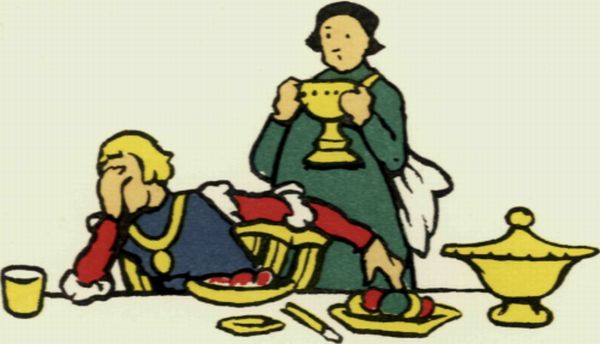
So, when the table was cleared, Daries desired his guest to declare his grief, if so be that help for it might be found in counsel. But said Lycoris again: 'Sir, so far as I can judge by his mien and bearing, I deem that this youth grieves for the maiden Blanchefleur, who, now shut up in the Admiral's high tower, spent two weeks with us in grievous sorrow of heart, bewailing her sad fate in being thus sold away far from the youth she loved, and for whose sake she shed many a tear and heaved many a sigh; and, as you may remember, sir, on leaving us this Blanchefleur was bought by the Admiral for ten times her weight in gold. Now, to my thinking, this youth is brother or lover to the maiden Blanchefleur.'
'No brother but her lover am I!' cried Fleur in glad surprise; then bethinking him how by such heedless speech his life was put in peril, he cried again: 'No! no! I don't mean that; I am brother and not lover to Blanchefleur. We are children of the same parents.'
'With all respect for your word, young sir, you contradict yourself in one breath,' said Daries the host. 'Best speak the truth out plainly as, forsooth, I now do in declaring that it were madness to come in quest of the maiden Blanchefleur; for, if the Admiral but hears of you, you are a dead man.'

'Sir,' said Fleur, 'hear the whole truth—I am son to the King of Spain, and seek my stolen Blanchefleur, without whom I cannot live; help me to her, and I will give you gold to your heart's content, for ere another moon has waxed and waned, find her I must or die.'
'Life,' replied Daries, 'were ill lost for sake of a maiden, whom no aid of mine can make your own, seeing that not, were the whole world to help you, could Blanchefleur be taken from the Admiral, Lord of a hundred kings, whose city Babylon is a four-square of twenty miles, and has for its defence walls full seventy feet in height, built of a stone so hard that no engine of war from enemies without can pierce their stony front, and in these walls are three-and-thirty doors of solid steel let in with cunning art, and high uplifted are seven hundred towers, the loftiest ever seen by mortal eye, and these towers are guarded by seven hundred great lords, each one of whom is great as any king; and if all these suffice not to prove the madness of your quest, know that in the heart of the city a mighty castle stands; four stories high is the castle, and on the fourth and topmost dwells your Blanchefleur, together with four other noble damsels in a fair chamber, whose windows are cased in wood of the sweet-scented myrtle tree, while its doors are formed of ebony that never yields to fire, and this ebony is overlaid with beaten gold, on which are graven strange devices of words and scroll and flower-work, and, because none but maidens dwell there, this tower is called the Maidens' Tower. In its midst stands a crystal pillar, and from the pillar gushes forth a fountain, whose waters are led on arches into every room, and so back into the pillar; and from the maidens' chamber a winding stair leads to that wherein dwells the Admiral himself, and whither, for fourteen days' service at a time, two maidens must wait morning and evening on their Lord, one with a fair linen towel, the other with water in a golden bowl. Fierce and cruel beyond words is the watchman of this tower, and any man who, without good and lawful cause, approaches it, he slays. Besides all this, the tower day and night is guarded by sixteen furious men, who never close their eyes in sleep; and there is yet another strange thing which you shall hear.
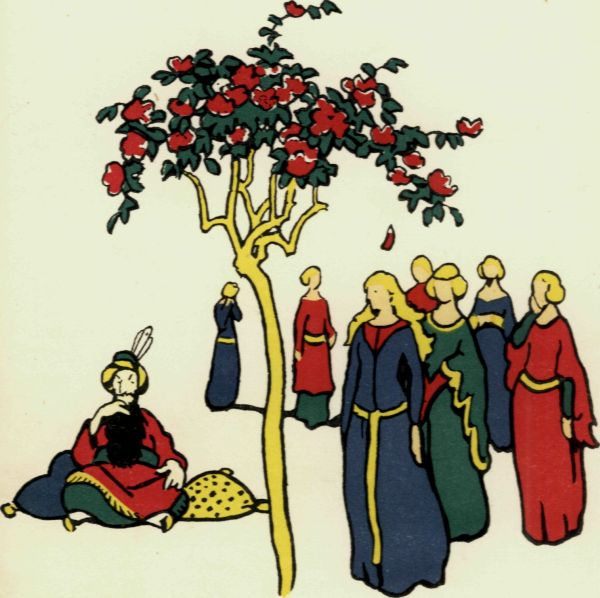
'Every springtide the Admiral takes to him a wife; and when the year is out, he calls to him all the lords, kings, and princes of his realm, and in their presence casts off his wife, and causes a knight to behead her, that no man may wed her after him; thus with the bitterness of an early death does she pay for the fleeting honour of royal wedlock; and when his wife is dead, the Admiral, with intent to replace her with another, summons the maidens who are within the tower to appear before him in a garden, which trembling they enter, none coveting the fatal honour of his choice. This garden, which walls of gold and lapis-lazuli enclose, contains noble trees of every kind, so that in it may be found at all seasons every fruit known to mankind; precious spices also abound, such as ginger, cinnamon, balm, cloves, nutmeg, and mace; all which, together with the scent of flowers and the song of birds, makes of this garden a very earthly paradise. In the midst of this paradise gushes forth a spring of clear water, and overhanging the spring is a tree, ever green and ever putting forth fresh blossoms and varied fruits.
'Beneath this tree the Admiral, surrounded by his lords, takes his seat; and when seated, he causes the maidens one by one to cross the stream before him; if they be good maidens and true the water remains clear as crystal, but if it turn dark and turbid they may prepare for death. This ordeal passed, the Admiral calls the maidens before him beneath the blooming tree, which by magic art drops one of its rosy blossoms on her whom its Lord loves best, and who accordingly becomes Queen for one fleeting year. Now, dear youth, bethink you what wise man would cheer you on in the quest of Blanchefleur, seeing that, ere this very month be out, the Admiral will hold this marriage feast with a new-made wife, who all say will be this Blanchefleur, whose loveliness has won his heart? Moreover, for some time past, it is she and Clarissa, her companion, who have been called to wait on their Lord, morning and evening, with the linen towel and the golden bowl; for which cause they live in daily terror of being chosen, the one or other, to be his crowned victim.'
'Oh good mine host!' cried Fleur, goaded to madness by what he heard, 'help me with your counsel how to act. My Blanchefleur will I claim within that garden, for she is mine, and mine alone. What if I die? Death for her sake is sweet, as it but sends me on before to that fair paradise whither her soul will follow mine, to dwell for ever amid the flowers.'
'Young man,' said the host, 'by your readiness to brave all perils—nay, even death itself—for sake of your dear love, I see that you are steadfast of purpose; and therefore, though perilling my own life thereby, I will give you counsel which, if followed, shall not turn to your hurt.' So saying, Daries took Fleur aside, and in secret unfolded to him a plan, which Fleur accepting with grateful heart followed out in such wise as the coming chapter will record.
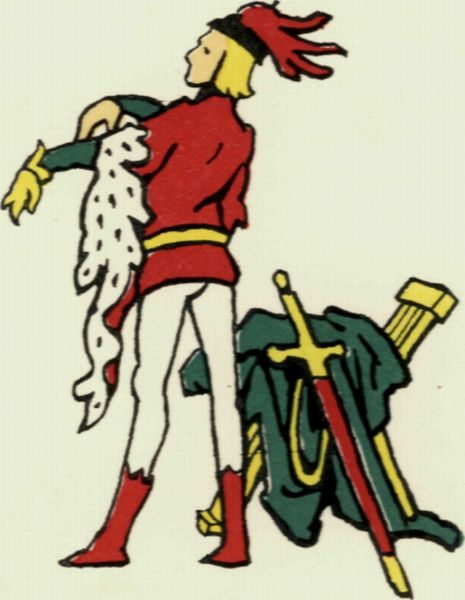
Arising betimes next day, Fleur, as instructed by his host, arrayed himself with great magnificence, and in this bravery of attire started for the Maidens' Tower. When come there, he set with great seeming earnestness and diligence to measuring the tower's dimensions of height, depth, length, and breadth; soon, however, his business was rudely interrupted by the watchman, who, catching sight of this measuring stranger, shouted at him for a spy, asking by what right or by whose leave he came there to meddle with the tower of the Lord High Admiral of Babylon.
Unabashed by this rough reception, Fleur replied in easy, careless phrase: 'Friend, the shape and form of your tower please me so well that I am taking their dimensions, with intent, on returning to my own land, of building me such a tower to be my treasure-house; and taking this one of yours to be used for the like purpose, I would fain seek admittance to examine it within as well as without, which admittance might indeed be granted to me without fear by you and your Lord, seeing that I am wealthier than the two of you put together.'
'In mistrusting this man I erred,' thought the watchman; 'for, indeed, such rich attire would ill become a spy.' So, after putting some searching questions to test his quality, the watchman, eased of doubt by the ready answers he received, invited the stranger to step into his house and play a game of chess; and when Fleur, accepting the challenge and invitation, was come in, his host and opponent said, 'Now, sir, say what shall be the stakes?'
'A hundred byzants a side,' said Fleur.
'Done with you!' cried the host; and when, at his call, a chess-board of ebony and ivory was brought, the two sate down to play.
Now Fleur wore upon his finger that priceless ring, his mother's parting gift, and in playing took heed to keep its gem turned outwards towards his opponent, who, seeing, coveted the jewel; and by keeping his eye on it and off the board, speedily lost the game, and with it, to his fury, the double stakes; but Fleur, forewarned by the friendly Daries that his antagonist's greed of gain equalled his love of chess, refused to take the winnings, and was accordingly invited by the grateful loser to come and play a return match on the morrow. Fleur accepted the challenge, and next day staking two hundred byzants against as many on the watchman's side, he again contrived, by help of the ring, to win the game and stakes, and as before handed over the latter to his antagonist, who, equally amazed and delighted by such unwonted liberality, declared himself ready to perform any service for so generous a player. Next day the stakes rose to four hundred byzants on either side, and were won by Fleur, who promptly relieved the horror of his host at such heavy loss by handing over to him the entire eight hundred. Overcome by such liberality, the watchman invited his noble opponent to a collation in his chamber on the following day; and when Fleur thus bidden appeared, he brought with him his splendid drinking-cup, and placed it on the board before him.
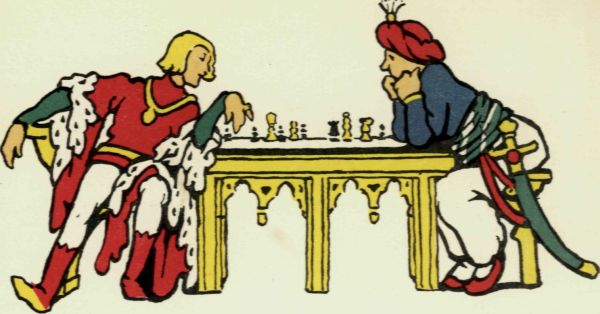
The watchman, unable to keep his eyes off the cup, so greatly did he admire it, offered, if his guest would play him for it, to stake a thousand byzants on his side.
'Sell or game away the cup I may not,' replied Fleur; 'but for help in the time of need I will freely give it.'
Then, overcome by greed of so goodly a gift, the watchman swore to Fleur that he would be his man, and do service good and true, whensoever and howsoever he might be called on.
Having thus made sure of the guardian of the tower, Fleur plainly said that he must find his way within to his beloved or die.
'Ah, friend!' cried the watchman, sorely repenting him of his rash promise; 'I fear me your riches have lured me on to the destruction of us both; nevertheless, the word that I have given I will keep, so return now to your lodging, and there abide for two days; and on the third, which will be May Day, come again to me, all clad from head to foot in rosy red, and you shall be borne up to the topmost story of the tower where Blanchefleur dwells.'

At the bidding of his watchman friend Fleur went back to his lodging, and there in hope and joy abode for two long days; and when the third, which was May Day, dawned, he arose and clad himself from head to foot in rosy red and hasted to the tower; and when he came to the guard-room, he found a great basket on the floor, and heaped up around the basket were all the fresh-blown flowers of spring that the watchman had caused to be gathered from the gardens of Babylon, as May-Day offering to Blanchefleur.
'Sir,' said the watchman, 'here lay you down within the basket and stir not.'
So when Fleur was laid down flat and still, within the basket, the watchman put a hat of red upon his head, and, this done, covered him all over with piles of flowers. This done, he called two strong porters and said, 'Carry up this basket of flowers as my May-Day offering to the maiden Blanchefleur, and when you have presented it, tarry not, but come again to me.'
So the porters, obedient to their officer, took up the basket and began to ascend the stairs; but ere they were half-way up, they began to halt and curse, vowing that never in all their days had they carried such heavy flowers; and when at length the top was reached, they mistook the chamber, for they knocked at Clarissa's door, shouting, 'Here, open! to receive the watchman's May-Day offering to the maiden Blanchefleur.'
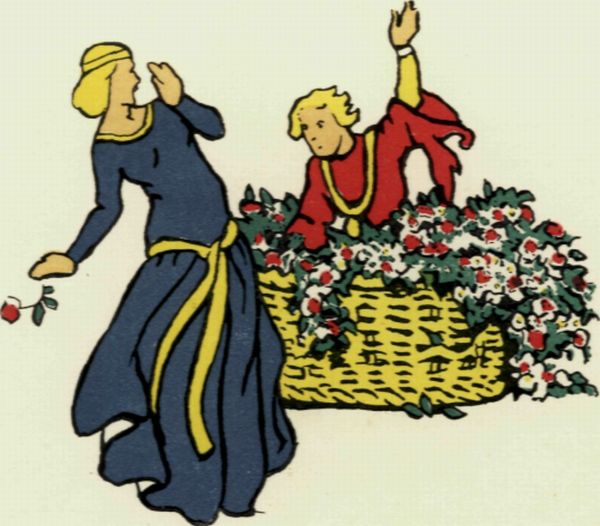
And at the sound of Blanchefleur's name Clarissa ran and opened wide the door; but without telling the porters of their error, she suffered them to bring their flowery burden in and then depart. When they were gone, Clarissa came and took from the basket a flower that pleased her, whereupon Fleur, thinking she was Blanchefleur, sprang out, and so startled the maiden that she cried in fright: 'Oh! what is that? Oh! what can that be?' And at her cry the other maidens came running in to know what had affrighted Clarissa, their companion, but Fleur they marked not, because he had laid him down again beneath the blossoms, and, being clothed in rosy red, was not distinguished from the roses which were his bed; then Clarissa, calling to mind how often she had heard Blanchefleur speak of a youth in Spain of form and face resembling her own, bethought her that this May-Day offering might be the Spanish love of Blanchefleur; so with a laugh she dismissed the maidens who were her fellows, saying that a hornet springing out from amid the flowers had frighted her. Reader, picture to yourself the terror of Fleur on finding he was discovered! But fortune was kind, for Clarissa, the captive daughter of a Duke of Alemannia, was the bosom friend of lovely Blanchefleur, and often had the two together bemoaned their lot in being the pair appointed to wait morning and evening on the Admiral with the linen hand-towel and water in the golden bowl.
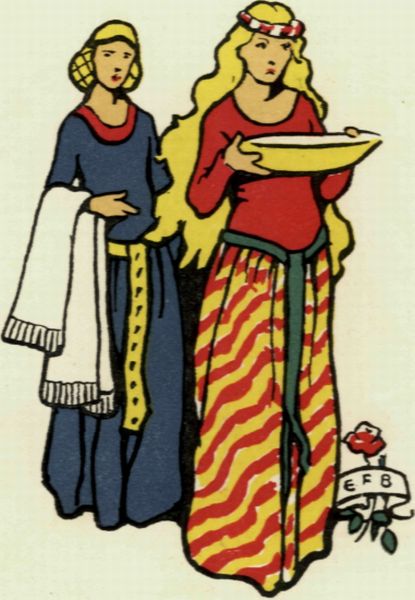
Now as the chambers of these two maidens adjoined, and a door led from the one into the other, Clarissa with care closed her outer door and passed through the inner one into the chamber of Blanchefleur, whom she found sitting all woebegone and rapt in thought of her absent love.
'Blanchefleur!' cried Clarissa, 'come with me and I will show you flowers such as you never saw before.'
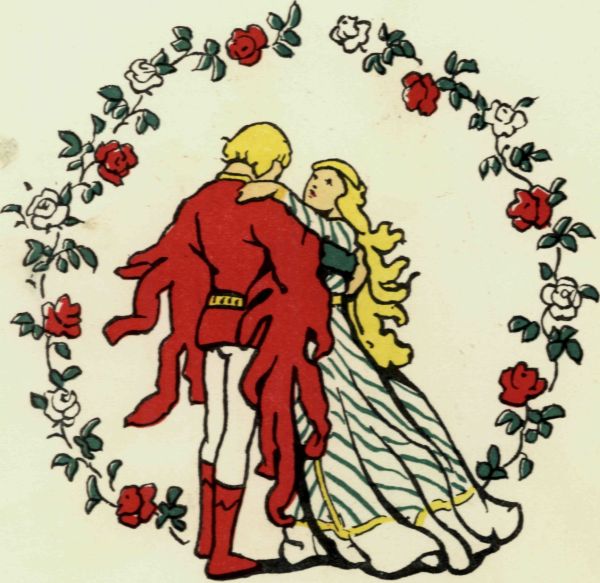
'Alas! Clarissa,' replied the mournful, drooping Blanchefleur, 'my heart is too heavy to be cheered by flowers, seeing that I am so far from my love and he from me.'
'Cease your wailing,' cried Clarissa, 'and dear as your love may be, yet come and see the lovely flowers!'
So Blanchefleur slowly rising came to see the flowers, whereupon Fleur, who heard the voice and knew his love was near, sprang from among the blossoms, all clad like the roses in rosy red, and Blanchefleur knew him, and he knew her, and they gazed speechless with love and joy face to face upon each other, and silently they fell on each other's neck with kisses and fond embraces, until at length Blanchefleur found words to say, 'Clarissa! behold my love! my heart's delight, my comfort, and my joy!' Then the two joined in praying good Clarissa not to part their love by declaring it, as that would be their death.
'Have no fear,' replied Clarissa; 'I will help you as best I can; the food and wine that are brought for two will suffice for three, and you will find me ever true.'
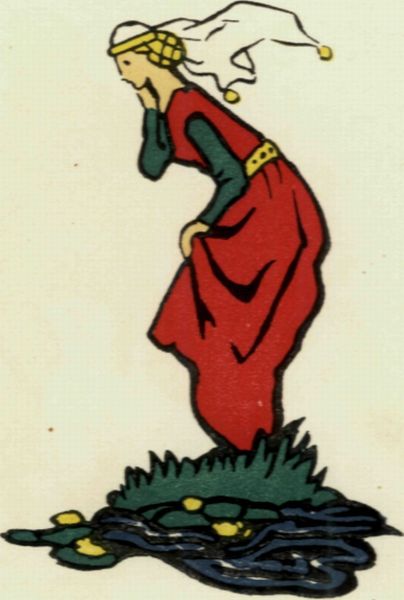
Then the two lovers went into Blanchefleur's chamber, and sitting them down upon the bed, which was spread with a gold-embroidered silken cover, they told each other all that had befallen them since their parting.
'Ah, love!' sighed Fleur, 'what have I not suffered for your sake? I had well-nigh died of sorrow.'
'And I,' said Blanchefleur, 'since the day on which you departed to Montorio, have known no joy, but have gone mourning for my love;' and then again the lovers kissed each other, and Fleur showed Blanchefleur the ring, his mother's parting gift, and told her of its magic power.
Meanwhile good Clarissa, trembling lest the secret of her friend should be betrayed, guarded it with jealous care as though it had been her own: so these three lived and ate and drank together, letting no living soul share their secret, and the lovers, happy as the day was long, would gladly thus have lived and died together, but, alas! the course of true love never can run smooth, and all too soon was their joy turned into sorrow.
One morning Clarissa woke to find the sun already high in the heavens; so, running in to Blanchefleur, she bade her too arise, as it was late, and full time that both were in attendance on their Lord.
'Go on before,' said Blanchefleur, half-waking and half-dreaming, and I will follow;' and she came not, but fell asleep again. So when Clarissa, returning from the spring with her golden bowl, again knocked, and this time got no answer, she hasted to the Admiral, thinking to find Blanchefleur gone on before to him, but she found her not.
'Why tarries Blanchefleur?' asked the Admiral, wondering that Clarissa came alone.
'Sire,' said Clarissa, 'all through the night, Blanchefleur was reading in her psalter and praying long life for you, and towards the morning she fell asleep and slumbers still.'
'That,' said the Admiral, well pleased, 'was a good work, and as reward for it Blanchefleur shall be my bride.'
Next morning the same thing happened. Again Clarissa overslept herself, and on waking found the sun already high in the heavens; again she called to Blanchefleur to make ready while she filled her golden bowl with water at the spring, and again Blanchefleur, half-waking and half-dreaming, replied, 'I come,' and came not, but fell back in slumber, so that Clarissa on hasting to their Lord found no Blanchefleur there.
'Where,' again asked the Admiral, 'is Blanchefleur?'
'Sire,' said Clarissa, 'I called in passing at her door ere filling my golden bowl with water at the spring, and Blanchefleur said she would be here before me.'
In some surprise the Admiral then bade a chamberlain go see why Blanchefleur tarried: so the chamberlain hasted to Blanchefleur's chamber, which was all ablaze with precious stones, and there, locked in each other's arms, found Fleur and Blanchefleur, and, taking Fleur in his tender beauty to be Clarissa, the chamberlain had not the heart to wake the two, but hasted back to tell his Lord how sweetly Blanchefleur and Clarissa slept, and, lo! Clarissa stood before him.
As for the Admiral, he turned white with fury.
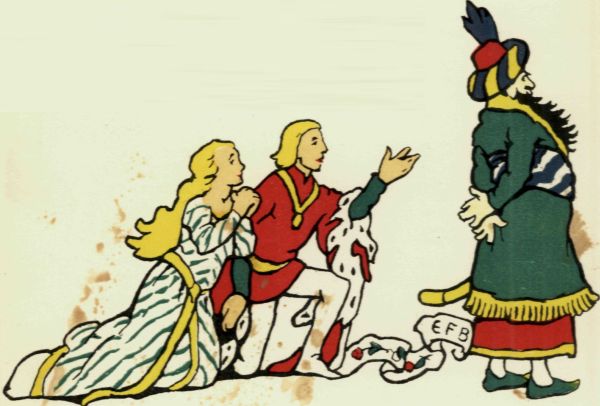
'Give me my sword,' cried the Admiral, 'and with it I will soon find who is this feigned Clarissa, for here the true one stands before me.' So saying, the furious Lord went with the chamberlain to Blanchefleur's chamber, and when the thick silken curtains were drawn aside and the bright sunlight streamed in, he beheld the sleeping pair, and so fair was Fleur that even the Admiral in his fury doubted if he were not a maiden, but all the same with uplifted sword he prepared to smite both Fleur and Blanchefleur to the death, when suddenly they awoke, and seeing before them this furious Lord with uplifted sword they shed bitter tears, well knowing that they must die. 'Miscreant!' cried the Admiral to Fleur, 'who are you, and how dared you enter into my Tower? For so doing you shall die the death.'
'Have mercy, sire,' said Fleur, 'on the maiden Blanchefleur and on me, for we love each other with a love more true and tender than has e'er been known before!'
Then came forward the chamberlain and prayed his Lord to spare the captives that they might have due trial for their offence.
To this respite the Admiral consented, but, fearing lest the prisoners might escape, he commanded that they were to be bound with ropes until by the lords of all the land sentence should be passed upon them. Now as the Admiral's yearly wedding festival was near at hand, the great lords of the realm, such as kings, dukes, counts and barons, were already assembled in Babylon; so they appeared without delay at the summons of their Lord in his glorious hall, which for splendour could not have been matched by Priam, King of Troy, for it was a full mile square, and crystal pillars supported its lofty dome. When, therefore, the Admiral was enthroned in majesty with all his lords around him, silence was commanded, while he thus addressed the assembly:
'My lords, hearken unto me, your King, and pass a sentence on these prisoners that will redound to my honour and your own. Behold this Blanchefleur, whom for a great price of ten times her own weight in gold I bought, thinking to promote her to honour by taking her as my one and only wedded wife on the day appointed for my marriage festival, and until that day came, that my eyes might be gladdened by her beauty, I brought her into my Maidens' Tower and ordained that she and Clarissa, her companion, should wait morning and evening upon me with a fair linen towel and water in a golden bowl; yet scarce had this Blanchefleur been for four months within my Tower than she betrayed me for another, whom with herself I had in righteous indignation well-nigh slain. So now, my lords, it is for you to pass judgment just and unbending upon these offenders.'

Responding to the call of their King and Admiral, these lords with one consent passed sentence of death upon the prisoners, though differing among themselves as to the execution of the same. Some were for hanging, others for the bow-string, while others again proposed that the culprits should be torn asunder by wild horses; most, however, were in favour of burning, or perhaps drowning with a heavy stone round the neck: on one point, however, all agreed—viz. that the guilty pair must die.
Then arose a certain king, Aliers by name, and thus spoke. 'It is a shame and disgrace,' said he, 'to hear in a royal court such babel of voices, each crying for a different opinion. Be so good, my lords, as to depute one among you to speak for all. Moreover, having now heard the accusation of His Highness, it is but just to listen to the prisoners' defence.'
'Not so,' cried Basier, King of Arabia, 'not so, my lords. If these prisoners have betrayed our Lord the Admiral, let them die unheard, like thieves caught in the act and punished red-handed without form of trial.'
The Admiral now commanded the prisoners to be produced, who when they appeared were very sad, regarding each other with tender pity.
'My Lord,' said Fleur to the Admiral, 'being guilty I am prepared to die, but spare my Blanchefleur, for she is innocent, seeing that without her knowledge I came within your Tower.'
'My Lord,' cried Blanchefleur, 'the guilt is mine, for had I not been in your Tower never would Fleur have sought to enter it. Moreover, it were shame that a king's son should die for me, who am but the daughter of his handmaid.'
'Not so, my Lord,' cried Fleur again; 'let me die, that Blanchefleur may live.'
'Be easy,' said the Admiral, 'for with my own hand I will slay you both.' So saying, he made for the prisoners with his drawn sword, whereupon Blanchefleur sprang forward and offered her neck for the blow, but was dragged back by Fleur, who with indignant tears exclaimed: 'What! Shall I, to my shame, suffer you, a woman, to die for me, who am a man, before the eyes of this great assembly?' And so saying, Fleur extended his neck instead for the death-blow, but Blanchefleur in turn pulled him back by his clothes and ran in before him, holding out her neck. Thus for some time these lovers strove, each seeking to die before the other, until for pity the lords began to weep, and even the Admiral, feeling his heart relent, let the sword drop from his hands.
Then stepped forward a certain Duke, and in the name of all present made earnest petitions for the prisoners' lives. 'Methinks,' said he, 'that for the safety and honour of our Lord the Admiral 'twere best to spare the prisoners, whose death would profit him not, whereas by freeing them on condition that Fleur revealed in what wise he stole into the Tower, His Highness may discover and punish his unfaithful servants.'
The Admiral, marking that all his lords were inclined to mercy, agreed to this Duke's proposal and offered their lives to the captives if Fleur would but tell how he made his way into the Tower.'
'That, sire, replied Fleur, 'I may only do under promise of pardon to those who were my helpers.'
'No! no!' cried the Admiral, furious at the thought of further mercy. 'They shall all die, every man among them.'
Then came forward a Bishop, who, falling at the Admiral's feet, entreated that the gracious mercy of His Highness might be extended to all concerned; 'for,' said the Lord Bishop, 'it would please the assembled company better to hear the prisoners' story than to behold their death.' These words of the Bishop were supported by all the lords, who with one acclaim called on their King and Admiral to pardon the prisoners at the prayer of his faithful subjects. So the Admiral gave ear to the prayer of his lords and pardoned the lovers and all and sundry who were their helpers, and when this was done Fleur arose and told the whole sweet and touching story of Blanchefleur and himself from the time of their birth up to the moment when they were found together in the Tower, and when his tale was told Fleur knelt down before the Admiral and entreated His Highness with tears for the gift of Blanchefleur, for whose sake he had done and suffered so great things; seeing, moreover, that without her he could not live, nor indeed could she, if torn from him, find life endurable.
Then the Admiral took Fleur by the hand, and kissing him bade him sit by his side as beseemed the son of a king, and taking Blanchefleur also by the hand His Highness said to Fleur: 'Friend, herewith I give and grant to you the maiden Blanchefleur, together with pardon full and free of all offence committed by you against my kingly power and majesty.'
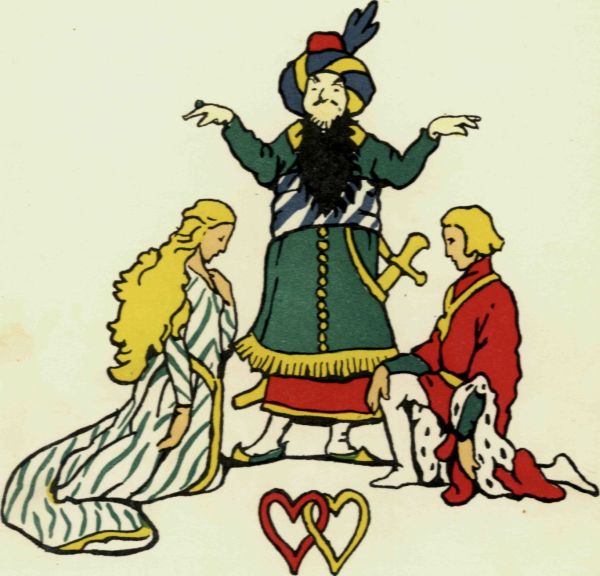
Overcome with joy and gratitude, those lovers sank at the feet of their benefactor, who raised and kissed them, and after that he made Fleur a knight according to the fashion of the land.
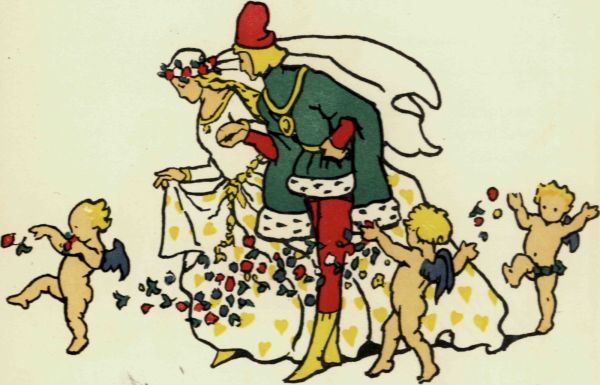
Now when all had turned out thus happily for Fleur and Blanchefleur, the Admiral proclaimed a great festival, and in pomp and splendour led to church Clarissa, daughter of the Duke of Alemannia, and there took her as his one and only wedded wife, to have and to hold, for better for worse, to his life's end: in the same church also and at the same time were Fleur and Blanchefleur united in holy wedlock. Then came the feast, at which the Admiral sat enthroned with his bride Clarissa on one side, and Fleur and Blanchefleur on the other, and after them all the lords of the realm, placed in order according to their rank. When the banquet was over the wedding guests diverted themselves with jousting, tilting, wrestling, and jumping matches, not forgetting music and song, that lasted for days together, and while the merry-making was at its height, behold! there came ambassadors bearing tidings from Spain that King Fenis and his Queen were dead, and the mourning country stood in sore need of the absent Fleur, heir and successor to the King deceased: and at these heavy tidings the joy of Fleur was turned to sorrow, and, seeking the Admiral, he prayed His Highness for permission to depart to his own country, which so sorely needed its King and ruler; but the Admiral, loath to part with the guest he had learned to love, sought to persuade Fleur, by promise of a greater and richer kingdom than his own, to give up land and people and abide with him; but when Fleur, whose heart was true to his home and Spain, would not be tempted from his purpose, the Admiral, commending his departing guests to the care of his gods, speeded him on his way with many a rich and costly gift. Thus did Fleur and Blanchefleur take their journey back again to Spain, and when they were come the people received them with great joy, and crowned Fleur King in the place of his father Fenis, and Blanchefleur they crowned as Queen, and so this happy pair lived on united in tender love together to their hundredth year, and when Fleur was made King he embraced the Christian faith of his Blanchefleur, and caused all his people to become Christians and receive baptism, and soon after these things Fleur inherited the land of Hungary from his uncle, who died childless; but to Fleur and his Queen Blanchefleur was born a daughter, Bertha by name, who became wife to King Pepin of France, and mother of Charles, that great Emperor whose fame is known throughout the world.

End of the Project Gutenberg EBook of Fleur and Blanchefleur, by Mrs. Leighton
*** END OF THIS PROJECT GUTENBERG EBOOK FLEUR AND BLANCHEFLEUR ***
***** This file should be named 14628-h.htm or 14628-h.zip *****
This and all associated files of various formats will be found in:
http://www.gutenberg.net/1/4/6/2/14628/
Produced by Juliet Sutherland, Melissa Er-Raqabi and the PG Online
Distributed Proofreading Team
Updated editions will replace the previous one--the old editions
will be renamed.
Creating the works from public domain print editions means that no
one owns a United States copyright in these works, so the Foundation
(and you!) can copy and distribute it in the United States without
permission and without paying copyright royalties. Special rules,
set forth in the General Terms of Use part of this license, apply to
copying and distributing Project Gutenberg-tm electronic works to
protect the PROJECT GUTENBERG-tm concept and trademark. Project
Gutenberg is a registered trademark, and may not be used if you
charge for the eBooks, unless you receive specific permission. If you
do not charge anything for copies of this eBook, complying with the
rules is very easy. You may use this eBook for nearly any purpose
such as creation of derivative works, reports, performances and
research. They may be modified and printed and given away--you may do
practically ANYTHING with public domain eBooks. Redistribution is
subject to the trademark license, especially commercial
redistribution.
*** START: FULL LICENSE ***
THE FULL PROJECT GUTENBERG LICENSE
PLEASE READ THIS BEFORE YOU DISTRIBUTE OR USE THIS WORK
To protect the Project Gutenberg-tm mission of promoting the free
distribution of electronic works, by using or distributing this work
(or any other work associated in any way with the phrase "Project
Gutenberg"), you agree to comply with all the terms of the Full Project
Gutenberg-tm License (available with this file or online at
http://gutenberg.net/license).
Section 1. General Terms of Use and Redistributing Project Gutenberg-tm
electronic works
1.A. By reading or using any part of this Project Gutenberg-tm
electronic work, you indicate that you have read, understand, agree to
and accept all the terms of this license and intellectual property
(trademark/copyright) agreement. If you do not agree to abide by all
the terms of this agreement, you must cease using and return or destroy
all copies of Project Gutenberg-tm electronic works in your possession.
If you paid a fee for obtaining a copy of or access to a Project
Gutenberg-tm electronic work and you do not agree to be bound by the
terms of this agreement, you may obtain a refund from the person or
entity to whom you paid the fee as set forth in paragraph 1.E.8.
1.B. "Project Gutenberg" is a registered trademark. It may only be
used on or associated in any way with an electronic work by people who
agree to be bound by the terms of this agreement. There are a few
things that you can do with most Project Gutenberg-tm electronic works
even without complying with the full terms of this agreement. See
paragraph 1.C below. There are a lot of things you can do with Project
Gutenberg-tm electronic works if you follow the terms of this agreement
and help preserve free future access to Project Gutenberg-tm electronic
works. See paragraph 1.E below.
1.C. The Project Gutenberg Literary Archive Foundation ("the Foundation"
or PGLAF), owns a compilation copyright in the collection of Project
Gutenberg-tm electronic works. Nearly all the individual works in the
collection are in the public domain in the United States. If an
individual work is in the public domain in the United States and you are
located in the United States, we do not claim a right to prevent you from
copying, distributing, performing, displaying or creating derivative
works based on the work as long as all references to Project Gutenberg
are removed. Of course, we hope that you will support the Project
Gutenberg-tm mission of promoting free access to electronic works by
freely sharing Project Gutenberg-tm works in compliance with the terms of
this agreement for keeping the Project Gutenberg-tm name associated with
the work. You can easily comply with the terms of this agreement by
keeping this work in the same format with its attached full Project
Gutenberg-tm License when you share it without charge with others.
1.D. The copyright laws of the place where you are located also govern
what you can do with this work. Copyright laws in most countries are in
a constant state of change. If you are outside the United States, check
the laws of your country in addition to the terms of this agreement
before downloading, copying, displaying, performing, distributing or
creating derivative works based on this work or any other Project
Gutenberg-tm work. The Foundation makes no representations concerning
the copyright status of any work in any country outside the United
States.
1.E. Unless you have removed all references to Project Gutenberg:
1.E.1. The following sentence, with active links to, or other immediate
access to, the full Project Gutenberg-tm License must appear prominently
whenever any copy of a Project Gutenberg-tm work (any work on which the
phrase "Project Gutenberg" appears, or with which the phrase "Project
Gutenberg" is associated) is accessed, displayed, performed, viewed,
copied or distributed:
This eBook is for the use of anyone anywhere at no cost and with
almost no restrictions whatsoever. You may copy it, give it away or
re-use it under the terms of the Project Gutenberg License included
with this eBook or online at www.gutenberg.net
1.E.2. If an individual Project Gutenberg-tm electronic work is derived
from the public domain (does not contain a notice indicating that it is
posted with permission of the copyright holder), the work can be copied
and distributed to anyone in the United States without paying any fees
or charges. If you are redistributing or providing access to a work
with the phrase "Project Gutenberg" associated with or appearing on the
work, you must comply either with the requirements of paragraphs 1.E.1
through 1.E.7 or obtain permission for the use of the work and the
Project Gutenberg-tm trademark as set forth in paragraphs 1.E.8 or
1.E.9.
1.E.3. If an individual Project Gutenberg-tm electronic work is posted
with the permission of the copyright holder, your use and distribution
must comply with both paragraphs 1.E.1 through 1.E.7 and any additional
terms imposed by the copyright holder. Additional terms will be linked
to the Project Gutenberg-tm License for all works posted with the
permission of the copyright holder found at the beginning of this work.
1.E.4. Do not unlink or detach or remove the full Project Gutenberg-tm
License terms from this work, or any files containing a part of this
work or any other work associated with Project Gutenberg-tm.
1.E.5. Do not copy, display, perform, distribute or redistribute this
electronic work, or any part of this electronic work, without
prominently displaying the sentence set forth in paragraph 1.E.1 with
active links or immediate access to the full terms of the Project
Gutenberg-tm License.
1.E.6. You may convert to and distribute this work in any binary,
compressed, marked up, nonproprietary or proprietary form, including any
word processing or hypertext form. However, if you provide access to or
distribute copies of a Project Gutenberg-tm work in a format other than
"Plain Vanilla ASCII" or other format used in the official version
posted on the official Project Gutenberg-tm web site (www.gutenberg.net),
you must, at no additional cost, fee or expense to the user, provide a
copy, a means of exporting a copy, or a means of obtaining a copy upon
request, of the work in its original "Plain Vanilla ASCII" or other
form. Any alternate format must include the full Project Gutenberg-tm
License as specified in paragraph 1.E.1.
1.E.7. Do not charge a fee for access to, viewing, displaying,
performing, copying or distributing any Project Gutenberg-tm works
unless you comply with paragraph 1.E.8 or 1.E.9.
1.E.8. You may charge a reasonable fee for copies of or providing
access to or distributing Project Gutenberg-tm electronic works provided
that
- You pay a royalty fee of 20% of the gross profits you derive from
the use of Project Gutenberg-tm works calculated using the method
you already use to calculate your applicable taxes. The fee is
owed to the owner of the Project Gutenberg-tm trademark, but he
has agreed to donate royalties under this paragraph to the
Project Gutenberg Literary Archive Foundation. Royalty payments
must be paid within 60 days following each date on which you
prepare (or are legally required to prepare) your periodic tax
returns. Royalty payments should be clearly marked as such and
sent to the Project Gutenberg Literary Archive Foundation at the
address specified in Section 4, "Information about donations to
the Project Gutenberg Literary Archive Foundation."
- You provide a full refund of any money paid by a user who notifies
you in writing (or by e-mail) within 30 days of receipt that s/he
does not agree to the terms of the full Project Gutenberg-tm
License. You must require such a user to return or
destroy all copies of the works possessed in a physical medium
and discontinue all use of and all access to other copies of
Project Gutenberg-tm works.
- You provide, in accordance with paragraph 1.F.3, a full refund of any
money paid for a work or a replacement copy, if a defect in the
electronic work is discovered and reported to you within 90 days
of receipt of the work.
- You comply with all other terms of this agreement for free
distribution of Project Gutenberg-tm works.
1.E.9. If you wish to charge a fee or distribute a Project Gutenberg-tm
electronic work or group of works on different terms than are set
forth in this agreement, you must obtain permission in writing from
both the Project Gutenberg Literary Archive Foundation and Michael
Hart, the owner of the Project Gutenberg-tm trademark. Contact the
Foundation as set forth in Section 3 below.
1.F.
1.F.1. Project Gutenberg volunteers and employees expend considerable
effort to identify, do copyright research on, transcribe and proofread
public domain works in creating the Project Gutenberg-tm
collection. Despite these efforts, Project Gutenberg-tm electronic
works, and the medium on which they may be stored, may contain
"Defects," such as, but not limited to, incomplete, inaccurate or
corrupt data, transcription errors, a copyright or other intellectual
property infringement, a defective or damaged disk or other medium, a
computer virus, or computer codes that damage or cannot be read by
your equipment.
1.F.2. LIMITED WARRANTY, DISCLAIMER OF DAMAGES - Except for the "Right
of Replacement or Refund" described in paragraph 1.F.3, the Project
Gutenberg Literary Archive Foundation, the owner of the Project
Gutenberg-tm trademark, and any other party distributing a Project
Gutenberg-tm electronic work under this agreement, disclaim all
liability to you for damages, costs and expenses, including legal
fees. YOU AGREE THAT YOU HAVE NO REMEDIES FOR NEGLIGENCE, STRICT
LIABILITY, BREACH OF WARRANTY OR BREACH OF CONTRACT EXCEPT THOSE
PROVIDED IN PARAGRAPH F3. YOU AGREE THAT THE FOUNDATION, THE
TRADEMARK OWNER, AND ANY DISTRIBUTOR UNDER THIS AGREEMENT WILL NOT BE
LIABLE TO YOU FOR ACTUAL, DIRECT, INDIRECT, CONSEQUENTIAL, PUNITIVE OR
INCIDENTAL DAMAGES EVEN IF YOU GIVE NOTICE OF THE POSSIBILITY OF SUCH
DAMAGE.
1.F.3. LIMITED RIGHT OF REPLACEMENT OR REFUND - If you discover a
defect in this electronic work within 90 days of receiving it, you can
receive a refund of the money (if any) you paid for it by sending a
written explanation to the person you received the work from. If you
received the work on a physical medium, you must return the medium with
your written explanation. The person or entity that provided you with
the defective work may elect to provide a replacement copy in lieu of a
refund. If you received the work electronically, the person or entity
providing it to you may choose to give you a second opportunity to
receive the work electronically in lieu of a refund. If the second copy
is also defective, you may demand a refund in writing without further
opportunities to fix the problem.
1.F.4. Except for the limited right of replacement or refund set forth
in paragraph 1.F.3, this work is provided to you 'AS-IS' WITH NO OTHER
WARRANTIES OF ANY KIND, EXPRESS OR IMPLIED, INCLUDING BUT NOT LIMITED TO
WARRANTIES OF MERCHANTIBILITY OR FITNESS FOR ANY PURPOSE.
1.F.5. Some states do not allow disclaimers of certain implied
warranties or the exclusion or limitation of certain types of damages.
If any disclaimer or limitation set forth in this agreement violates the
law of the state applicable to this agreement, the agreement shall be
interpreted to make the maximum disclaimer or limitation permitted by
the applicable state law. The invalidity or unenforceability of any
provision of this agreement shall not void the remaining provisions.
1.F.6. INDEMNITY - You agree to indemnify and hold the Foundation, the
trademark owner, any agent or employee of the Foundation, anyone
providing copies of Project Gutenberg-tm electronic works in accordance
with this agreement, and any volunteers associated with the production,
promotion and distribution of Project Gutenberg-tm electronic works,
harmless from all liability, costs and expenses, including legal fees,
that arise directly or indirectly from any of the following which you do
or cause to occur: (a) distribution of this or any Project Gutenberg-tm
work, (b) alteration, modification, or additions or deletions to any
Project Gutenberg-tm work, and (c) any Defect you cause.
Section 2. Information about the Mission of Project Gutenberg-tm
Project Gutenberg-tm is synonymous with the free distribution of
electronic works in formats readable by the widest variety of computers
including obsolete, old, middle-aged and new computers. It exists
because of the efforts of hundreds of volunteers and donations from
people in all walks of life.
Volunteers and financial support to provide volunteers with the
assistance they need, is critical to reaching Project Gutenberg-tm's
goals and ensuring that the Project Gutenberg-tm collection will
remain freely available for generations to come. In 2001, the Project
Gutenberg Literary Archive Foundation was created to provide a secure
and permanent future for Project Gutenberg-tm and future generations.
To learn more about the Project Gutenberg Literary Archive Foundation
and how your efforts and donations can help, see Sections 3 and 4
and the Foundation web page at http://www.pglaf.org.
Section 3. Information about the Project Gutenberg Literary Archive
Foundation
The Project Gutenberg Literary Archive Foundation is a non profit
501(c)(3) educational corporation organized under the laws of the
state of Mississippi and granted tax exempt status by the Internal
Revenue Service. The Foundation's EIN or federal tax identification
number is 64-6221541. Its 501(c)(3) letter is posted at
http://pglaf.org/fundraising. Contributions to the Project Gutenberg
Literary Archive Foundation are tax deductible to the full extent
permitted by U.S. federal laws and your state's laws.
The Foundation's principal office is located at 4557 Melan Dr. S.
Fairbanks, AK, 99712., but its volunteers and employees are scattered
throughout numerous locations. Its business office is located at
809 North 1500 West, Salt Lake City, UT 84116, (801) 596-1887, email
business@pglaf.org. Email contact links and up to date contact
information can be found at the Foundation's web site and official
page at http://pglaf.org
For additional contact information:
Dr. Gregory B. Newby
Chief Executive and Director
gbnewby@pglaf.org
Section 4. Information about Donations to the Project Gutenberg
Literary Archive Foundation
Project Gutenberg-tm depends upon and cannot survive without wide
spread public support and donations to carry out its mission of
increasing the number of public domain and licensed works that can be
freely distributed in machine readable form accessible by the widest
array of equipment including outdated equipment. Many small donations
($1 to $5,000) are particularly important to maintaining tax exempt
status with the IRS.
The Foundation is committed to complying with the laws regulating
charities and charitable donations in all 50 states of the United
States. Compliance requirements are not uniform and it takes a
considerable effort, much paperwork and many fees to meet and keep up
with these requirements. We do not solicit donations in locations
where we have not received written confirmation of compliance. To
SEND DONATIONS or determine the status of compliance for any
particular state visit http://pglaf.org
While we cannot and do not solicit contributions from states where we
have not met the solicitation requirements, we know of no prohibition
against accepting unsolicited donations from donors in such states who
approach us with offers to donate.
International donations are gratefully accepted, but we cannot make
any statements concerning tax treatment of donations received from
outside the United States. U.S. laws alone swamp our small staff.
Please check the Project Gutenberg Web pages for current donation
methods and addresses. Donations are accepted in a number of other
ways including including checks, online payments and credit card
donations. To donate, please visit: http://pglaf.org/donate
Section 5. General Information About Project Gutenberg-tm electronic
works.
Professor Michael S. Hart is the originator of the Project Gutenberg-tm
concept of a library of electronic works that could be freely shared
with anyone. For thirty years, he produced and distributed Project
Gutenberg-tm eBooks with only a loose network of volunteer support.
Project Gutenberg-tm eBooks are often created from several printed
editions, all of which are confirmed as Public Domain in the U.S.
unless a copyright notice is included. Thus, we do not necessarily
keep eBooks in compliance with any particular paper edition.
Most people start at our Web site which has the main PG search facility:
http://www.gutenberg.net
This Web site includes information about Project Gutenberg-tm,
including how to make donations to the Project Gutenberg Literary
Archive Foundation, how to help produce our new eBooks, and how to
subscribe to our email newsletter to hear about new eBooks.